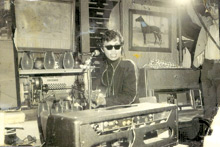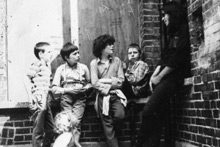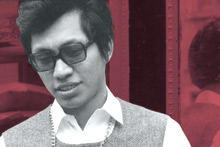His first name is Sixto, but since the late ‘60s, he has performed under his last name only, Rodriguez. Yet unlike other one-name musical artists, a Prince, a Madonna, a Beyonce or a Liberace, his name isn’t a household word (unless your household is in South Africa, but that part of the story comes later).

He’s only released two albums’ worth of songs, and hasn’t recorded any new studio material since 1971. But life-long Detroit resident Rodriguez has been getting a lot of attention lately, thanks to a recent Light in the Attic reissue of his debut LP, Cold Fact.
The album, barely reviewed on its first release in 1970, showed up on numerous music magazine “best reissues of the year” lists in 2008, from Uncut to Mojo to Rolling Stone. And now Rodriguez is playing his first full-scale gigs in America, 40 years after his career began. For his first (and currently only) gig in the Southeast, he’ll be playing at the Grey Eagle.
But this isn’t Rodriguez’s first taste of accolades and late-in-life success—just the first time in America.
“It’s through the Internet that most of my success has happened,” Rodriguez tells Xpress. “It’s changed so much from the early ‘70s, where it was just a domestic market, because now it’s a global market. People can dream further now.”
The Light in the Attic release is the first U.S. reissue of the album, and people who hear it are responding. Cold Fact is one of those rare forgotten gems that connects with almost any music fan. A favorite among record hunters for years, it has maintained its legend through multiple word-of-mouth cults. No matter what type of collector, be they psych heads, grunge rockers, beat-seeking hip-hoppers or fans of morose folk singersongwriters, Cold Fact rewards them all.

The music is all over the map—a touch of soul, psychedelia, heavy rock riffs and fuzz guitar, some folk and some Beatlesque pop flourishes, played by some of the best musicians late ‘60s Detroit had to offer. As far as themes go, it’s got drugs, sex, heartbreak and romance, urban squalor and social protest, all united by Rodriguez’s majestic melodies and clever, plainspoken language, unforgettably framed by the strikingly appropriate and memorable production of Dennis Coffey and Mike Theodore.
“It’s got great hooks, and his voice is beautiful, and his perspective is so unusual,” says Reigning Sound frontman Greg Cartwright, part of the local pick-up band that will back Rodriguez at the Grey Eagle show. “It sounds like something that could have been on the radio, except for the content … and that’s the best part. He really seems to capture that whole Detroit inner city thing, and it’s a pretty ugly picture that he paints, but the way he talks about it is so beautiful.”
The son of working class Mexican immigrants, Rodriguez spent his formative musical years playing inner city bars of all sorts—hooker bars, biker hangouts and gay bars. It was in one of these out-of-the-way places where he was discovered.
“It was the crowd I hung around with, so it was the places I even thought to play in,” says Rodriguez, speaking about his unusual choice of venue. “They [Theodore and Coffey] came to the club where I was playing, and I was looking for a deal.”
Rodriguez’ unique take on the then-budding singer/songwriter genre seemed a natural premier release for a budding label called Sussex. Coffey, now a legend among crate-diggers for introducing the “wah-wah” to Motown and creating some classic instrumental funk sounds (the Black Belt Jones soundtrack, the famous instrumental “Scorpio”), played guitar on the record. And Funk Brothers’ Bob Babbit and Andrew Smith provided the rhythm section.

“I like about it what I don’t like about Bob Dylan sometimes,” says Kim Roney, who’ll play keyboards to back Rodriguez. “He seems to be saying exactly what he wants to say instead of playing mind games.”
Discussing some of his more outspoken lyrics, Rodriguez says: “It’s just getting’ it off your … gettin’ it off your desk … to mention these things. So much can happen to you in one day that you can write a book. I tried to pack it with all these distractions that affected people. It clears the head.”
And while the result was a record with rarely a dull moment in its bustling-yet-relaxed 30-minute runtime, the album failed to generate sales. A second album, Coming from Reality, released in 1971, sold even more poorly than the debut, and the label moved on to other artists. Rodriguez got a day job.
East West Asheville all-stars: Rodriguez’s backing band
When he first heard Cold Fact, Harvest Records co-owner Mark Capon was enchanted and impressed. He didn’t know then that fate was calling him to step from behind the record counter and onto the stage to support Rodriguez on his first-ever Southern gig.
“I heard it first as a promo from the record label,” Capon said. “It wasn’t very long before I was totally in love with how he bounced back and forth between trippy psych sounds to simple, beautiful ballad poetry. I didn’t understand how … somehow this got lost. What a crime.”
The Harvest owners found out that booking Rodriguez was a possibility, but only if they could provide a group to back him. Instead of cribbing from other bands, Capon looked to acquaintances from around “East West Asheville”—people he knew were musicians, but who weren’t gigging regularly in Asheville.
“We picked friends first and foremost, friends that we knew enjoyed the record,” Capon said.
One of the first friends Capon and Harvest co-owner Matt Schnable called on was Kim Roney, a pianist who works at both Harvest and the Admiral. Roney is also the music director at WPVM.
“It’s been a really fun experience seeing some of my friends I knew could play instruments really bring their ‘A’ game,” Roney said.
For drums, Capon enlisted Drew Wallace, co-owner of the Admiral. It turns out Capon, Schnable, and Roney knew Wallace from one of his old bands, Guyana Punchline, when they’d booked his group for the Mid Atlantic College Radio Conference in 2003.
“I was very selfish in picking myself to play bass,” said Capon, himself a veteran of several bands. “What with the complicated, loud bass lines throughout Cold Fact.”
To round things out, Capon called in a ringer—Asheville’s own rock and roller of some underground repute, Greg Cartwright, who also DJs at the Admiral on Saturday nights. Cartwright agreed to join the band and open the show as a solo act.
“Greg was a natural choice. He’s worked with so many artists and songwriters over the years,” Capon said.
Together the quartet has been navigating the music of Rodriguez, trying to anticipate how he’ll want to play the songs, preparing to play the music with the man himself forty years after the fact.
“The trickiest part is figuring out the exact keys the songs are in,” Capon noted. “Whether it was out-of-tune originally, or thru tape manipulation, Cold Fact is some bizarre quarter-step off of any standard tuning. We’ve conquered that now.”
What about rehearsing for the gig without the presence of the main act? “It can be difficult to stay together because the words are such a big part of the music,” Roney said. “We all take turns singing or screaming or whistling along.”
—W.S.
who: Rodriguez with opener Greg Cartwright
where: The Grey Eagle
when: Saturday, Jan. 10 (9 p.m. $12 advance, $15 doors. www.thegreyeagle.com)
“After the label folded I went back to work,” Rodriguez says. “Basic hard labor. I’m working-class. Nothing beats reality so I had to do something actual.”
Through the ‘70s, Rodriguez continued his education and got involved in politics, getting his BA in philosophy in 1981 from Wayne State University (of his education, he notes, “There’s a whole lot you don’t learn in school.”) He also occasionally ran for Detroit office.
“I’ve run for office eight times now. I ran for state rep, for city council and mayor,” Rodriguez says. “I consider myself a political musician … I sing about it but I want to do something about it as well.”
But Rodriguez’s musical fate was not that of so many hopefuls from the late ‘60s and early ‘70s consigned to the cutout bins. Cold Fact refused to die. In the late ‘70s and early ‘80s, he was amazed to discover that he had an enthusiastic group of followers in Australia and New Zealand. He did a couple of tours of mid-size venues and went back to his life.
But the real surprise came in the late ‘90s, when he discovered that he was not only popular in South Africa—he was a cultural force. It turned out that the Cold Fact album, with its references to sex and drugs and its truth-to-power lyrics, became a kind of rite of passage among teenage Afrikaners feeling oppressed by their repressive government. Many Afrikaner soldiers, whose arbitrary terms of service echoed the U.S. drafts of the late ‘60s, connected deeply with the record—it was distributed like wildfire on bootleg cassettes.
“The apartheid thing was happening at the same time all of the things were happening in Detroit. I think that had a lot to do with it,” Rodriguez says.
In South Africa, urban legends sprung up over the fate of their unknown rock hero—many presumed him dead. Shocked when one of his daughters told him about a Web site from South Africa called “The Great Rodriguez Hunt”, he soon found himself in the surreal experience of playing 5,000-seat arenas, for fans that sang along with every word.
“Once I saw the audience I knew it was real. People can tell you that you’re this big or that big, but it’s hard to really believe them,” Rodriguez says. “But once I saw them, and they knew all the lyrics, it became real to me. And that’s how I started my career as a touring musician.”
Now the late-in-life troubadour finds himself playing for the first time to crowds of what he calls “young bloods” who weren’t even born when he cut his first album. For budget reasons, he works without a touring band, instead getting together with local enthusiasts who are eager to play with him. [See sidebar about the Asheville combo backing Rodriguez].
“I have bands all over the world now. In Sweden, South Africa, Australia, L.A. And I don’t always speak their language, but the music carries us through,” he says.
Light in the Attic will be rereleasing Coming from Reality in May of 2009. Rodriguez plans to promote the two records into the next year, and hopes to record some new material in the near future.
“I didn’t have a blueprint for what I was doing,” Rodriguez says. “I loved music and I planned to stay with it, and it didn’t really matter whether it was ‘right’ or not. Some are luckier than others, and I’m lucky.”
[Whitney Shroyer can be reached at whizzkid1@whizzkid1.com.]



Good article. [i]Cold Fact[/i] is an awesome record, and it really showcases Rodriguez as a class warrior.
I really dig this guy, so much in fact that I wrote about him on my blog.
http://jasonbugg.blogspot.com/2008/10/project-fridays-why-im-always-angry.html
Thanks to Harvest Records for bringing Rodriguez to Asheville! Thanks to folks for coming to the show… it was so much fun to share this experience with you!